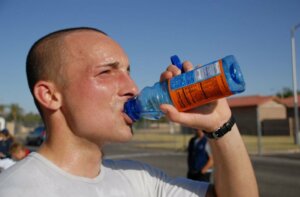What Causes Fainting During Exercise?

Fainting during exercise is certainly a cause for concern, and people are likely to think that there is a serious cause behind it. Fortunately, the reasons for fainting during exercise are normally quite simple to resolve and aren’t life-threatening.
In any case, you can never be too careful when it comes to your health. This is especially true when we’re talking about young people who should be in good health. And furthermore, if we’re talking about professional athletes, it could be even more serious and require checks for underlying health issues.
However, if we compare athletes to the general population, we’ll see that there’s a reduced risk of fainting among athletes. In the general population, around 40 percent of people will faint at some point in their life. For athletes, this falls to just six percent.
The medical term for fainting is a syncope. This, when someone loses consciousness because of a lack of blood flow to the brain. Recovery is normally quick and spontaneous.
Causes of fainting during exercise
In the vast majority of cases, fainting during exercise is usually caused by something fairly benign. For athletes, this might mean factors relating to their lifestyle or training. Let’s take a look at some possible causes.
A drop in blood sugar
Hypoglycemia is the medical term for when blood sugar levels drop too low. Sugar for the cells in the body comes from glucose, which you acquire through food and drink.
When practicing sports, the body needs the blood to supply more glucose than usual. If this doesn’t happen, then some systems can fail, and this can include fainting.

Fainting during exercise: dehydration
Just as the body needs sugar to function, it also needs plenty of fluids. This means that when exercising, it’s important to compensate for the fluids lost through perspiration and rapid breathing.
A lack of fluids can affect your blood pressure. If you become dehydrated when playing a sport, your blood pressure will drop as the arteries struggle to maintain the blood flow. This means that enough blood doesn’t reach the brain and can cause you to faint.
It’s also important to consider electrolytes, such as sodium, potassium, and chlorine. These are suspended in the blood plasma and play an important role in regulating blood pressure. Energy drinks are a good option for replenishing them.
Lifting excessive weights
Fainting during weight lifting is the result of the Valsalva maneuver. This happens when you hold your breath for a long time, thereby increasing the pressure inside the abdomen.
This maneuver is part of the technique for lifting weights. If the person isn’t highly trained or doesn’t breathe properly, the flow of blood to the brain will be interrupted and they’ll become dizzy. Obviously then, there’s a greater chance of them fainting.
Poor breathing technique
Having already mentioned the Valsalva maneuver, it’s time to talk about the correct breathing technique. In endurance sports, such as running, the problem may be excessive gas exchange.
Rapid breathing stops the body from absorbing enough oxygen and this is a problem for the brain. Some neural functions switch off and this ends in a blackout. Once passed out, the body recovers and breathing becomes more regular.
What to do to prevent fainting during exercise?
There are a number of basic steps you can take to prevent fainting during exercise. Sometimes, you’ll be able to follow all of these guidelines, and other times, it’ll be difficult to follow them all. But, you should always look for ways to keep your blood circulating as much as possible.
Hydration is the first step. You need to make sure you have enough fluids and salts to prevent dehydration. This can be complemented by a balanced diet that includes good sources of electrolytes.

Extreme climates are obviously a risk factor when taking part in sport. However, sometimes, athletes deliberately train in these conditions to test themselves. In such cases, it’s important to take specific precautions to avoid hypothermia or heat stroke.
If you’re taking part in a one-off event that demands a lot from your body, training will be key. Ideally, you should spend the week before training in the same conditions as the event to help your body to acclimatize. At the very least, you should try to emulate those conditions to lessen the shock to your system.
Fainting during exercise: conclusion
If you take these simple steps, you can greatly reduce the risk of fainting during exercise. However, don’t forget to have regular medical check-ups for extra reassurance.
Fainting during exercise is certainly a cause for concern, and people are likely to think that there is a serious cause behind it. Fortunately, the reasons for fainting during exercise are normally quite simple to resolve and aren’t life-threatening.
In any case, you can never be too careful when it comes to your health. This is especially true when we’re talking about young people who should be in good health. And furthermore, if we’re talking about professional athletes, it could be even more serious and require checks for underlying health issues.
However, if we compare athletes to the general population, we’ll see that there’s a reduced risk of fainting among athletes. In the general population, around 40 percent of people will faint at some point in their life. For athletes, this falls to just six percent.
The medical term for fainting is a syncope. This, when someone loses consciousness because of a lack of blood flow to the brain. Recovery is normally quick and spontaneous.
Causes of fainting during exercise
In the vast majority of cases, fainting during exercise is usually caused by something fairly benign. For athletes, this might mean factors relating to their lifestyle or training. Let’s take a look at some possible causes.
A drop in blood sugar
Hypoglycemia is the medical term for when blood sugar levels drop too low. Sugar for the cells in the body comes from glucose, which you acquire through food and drink.
When practicing sports, the body needs the blood to supply more glucose than usual. If this doesn’t happen, then some systems can fail, and this can include fainting.

Fainting during exercise: dehydration
Just as the body needs sugar to function, it also needs plenty of fluids. This means that when exercising, it’s important to compensate for the fluids lost through perspiration and rapid breathing.
A lack of fluids can affect your blood pressure. If you become dehydrated when playing a sport, your blood pressure will drop as the arteries struggle to maintain the blood flow. This means that enough blood doesn’t reach the brain and can cause you to faint.
It’s also important to consider electrolytes, such as sodium, potassium, and chlorine. These are suspended in the blood plasma and play an important role in regulating blood pressure. Energy drinks are a good option for replenishing them.
Lifting excessive weights
Fainting during weight lifting is the result of the Valsalva maneuver. This happens when you hold your breath for a long time, thereby increasing the pressure inside the abdomen.
This maneuver is part of the technique for lifting weights. If the person isn’t highly trained or doesn’t breathe properly, the flow of blood to the brain will be interrupted and they’ll become dizzy. Obviously then, there’s a greater chance of them fainting.
Poor breathing technique
Having already mentioned the Valsalva maneuver, it’s time to talk about the correct breathing technique. In endurance sports, such as running, the problem may be excessive gas exchange.
Rapid breathing stops the body from absorbing enough oxygen and this is a problem for the brain. Some neural functions switch off and this ends in a blackout. Once passed out, the body recovers and breathing becomes more regular.
What to do to prevent fainting during exercise?
There are a number of basic steps you can take to prevent fainting during exercise. Sometimes, you’ll be able to follow all of these guidelines, and other times, it’ll be difficult to follow them all. But, you should always look for ways to keep your blood circulating as much as possible.
Hydration is the first step. You need to make sure you have enough fluids and salts to prevent dehydration. This can be complemented by a balanced diet that includes good sources of electrolytes.

Extreme climates are obviously a risk factor when taking part in sport. However, sometimes, athletes deliberately train in these conditions to test themselves. In such cases, it’s important to take specific precautions to avoid hypothermia or heat stroke.
If you’re taking part in a one-off event that demands a lot from your body, training will be key. Ideally, you should spend the week before training in the same conditions as the event to help your body to acclimatize. At the very least, you should try to emulate those conditions to lessen the shock to your system.
Fainting during exercise: conclusion
If you take these simple steps, you can greatly reduce the risk of fainting during exercise. However, don’t forget to have regular medical check-ups for extra reassurance.
All cited sources were thoroughly reviewed by our team to ensure their quality, reliability, currency, and validity. The bibliography of this article was considered reliable and of academic or scientific accuracy.
- León, Aridane Cárdenes, et al. Abordaje del síncope relacionado con el deporte. Archivos de medicina del deporte: revista de la Federación Española de Medicina del Deporte y de la Confederación Iberoamericana de Medicina del Deporte 179 (2017): 157-165.
- Alvarado, Andrés, Carlos Quiroz, and Iván Melgarejo. Síncope inducido por el ejercicio. Reporte de un caso. (2011).
- León, Aridane Cárdenes, et al. Síncope en el deportista. La importancia de distinguir entre patologías potencialmente letales versus etiología benigna. Revista andaluza de medicina del deporte 12.1 (2019): 47-49.
- para el Diagnóstico, Grupo de Trabajo, et al. Guía de práctica clínica para el diagnóstico y manejo del síncope (versión 2009). Revista Española de Cardiología 62.12 (2009): 1466-e1.
- Armengol, Juan Jorge González, Antonio López Farré, and Fernando Prados Roa. Síncope de esfuerzo y riesgo de muerte súbita en deportistas jóvenes: perspectiva clínica y genética. Emergencias: Revista de la Sociedad Española de Medicina de Urgencias y Emergencias 23.1 (2011): 47-58.
- Lanza Postigo, María. La muerte súbita en jóvenes deportistas. (2019).
This text is provided for informational purposes only and does not replace consultation with a professional. If in doubt, consult your specialist.








